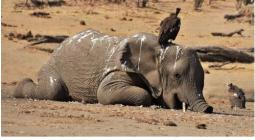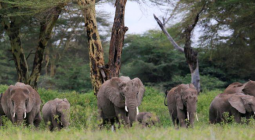Death toll rises to seven in Malawi elephant relocation project linked to Prince Harry NGO
Exclusive: The animal translocation scheme by wildlife NGOs including African Parks, once headed by the royal, has been dogged by controversy
Four more people have died after an elephant translocation overseen by two wildlife organisations, including one that was headed by Prince Harry, in a protected area in Malawi. The recent deaths bring the total fatalities connected to the relocated elephants to seven.
In July 2022, more than 250 elephants were moved from Liwonde national park in southern Malawi to the country’s second-largest protected area, Kasungu, in a three-way operation between Malawi’s national park service and two NGOs: the International Fund for Animal Welfare (Ifaw), and African Parks. Prince Harry was president of African Parks for six years, before being elevated to the board of directors from 2023.
The movement of elephants was among the largest of its kind ever attempted, the conservation groups said at the time. The groups used images of the 263 elephants being transported for fundraising, and videos of the huge animals being lifted by crane were described as “scenes reminiscent of the Disney classic Dumbo”.
In the days after the translocation, however, two people were killed by elephants in the area the animals were moved to, and a third person was killed in September that year. Communities warned of growing problems with human-wildlife conflict with the African mammals, which frequently raid crops.
After the move, a community leader accused the wildlife NGOs of caring more about animals than people. An electric fence to protect people on the edge of the park had not been completed, he said, highlighting that the elephants had been moved from a protected area that already had a fence. Ifaw and the Malawian national park service contest that this was a condition of the translocation. African Parks disputed that the movement of the elephants had been rushed.
Now, a further four people have been killed by elephants in Kasungu, bringing the total fatalities to seven, with areas of the fence still incomplete. The deaths have left several children orphaned and some families struggling to get by, the Guardian understands. Ifaw continued to raise funds using news of the translocation in 2023. The NGO said its Room to Roam initiative to protect elephants offered a solution to biodiversity loss and the climate crisis.
On the Malawian side of the park in June 2023, 31-year-old Masiye Phiri was killed and her two-year-old child was injured when they were charged by a bull elephant in a garden after a group had left the park boundaries. In August 2023, Jackson Banda was killed by an elephant, again after several elephants got out of the park. The next month, Boniface Nkhoma was attacked by elephants at night while walking on a road when the mammals had again gone beyond the park boundaries.
On the Zambian side, Andrew Phiri, 65, was killed by a bull elephant in September 2023. The Guardian was told by local sources of a fifth death but could not confirm details. Ifaw said it was aware of seven deaths since the elephants were translocated.
Malidadi Langa, chair of an association of villages near Kasungu national park on the Malawian side, who welcomed the elephant translocation as a boost to tourism, called for the creation of an insurance scheme to compensate affected families. He said elephant-human conflict was affecting some of the poorest and most marginalised families.
“Although, with hindsight, we wish things could have been done better to prevent and mitigate the negative impact of the translocation in elephant-human conflict, we now want to focus more on finding solutions,” Langa said.
“Although good progress is being made on construction of the electric fence around Kasungu national park, such fencing needs to be embedded in policy and legal frameworks as a requirement, given that Malawi’s protected areas are bounded by dense human settlements.
“We want the introduction of some form of a human-wildlife conflict insurance scheme to offset losses suffered by victims. This is against the background of our experience with the translocation to date and the reality that human-wildlife conflict is exacerbating inequality since it affects already poor and marginalised communities living in hard-to-reach areas on the edge of the park,” he said.
In a statement, Ifaw said it was deeply saddened by each death or injury caused by elephants that have strayed from Kasungu. It said it works closely with the Malawian and Zambian governments to coordinate on human-wildlife conflict, and had been providing community support. It said 57 miles of fencing near the park and been completed and an additional 25 miles would be finished in 2024.
“Ifaw operates within the policy and legal framework of the governments of Malawi and Zambia. It is the government’s responsibility to deal with compensation in such matters, although there exists no such legal provision within the law of the two governments. Ifaw is bound to follow protocol in the management of these areas. However, Ifaw works with the governments to support the families tragically affected by human-elephant conflict by providing logistical and financial support – such as food, transport and coffins for the funerals of the deceased,” it said.
Malawi’s national park service said there had been a substantial reduction in human-wildlife conflict in areas where the fence had been built. It said more staff had been hired to safeguard the community from raiding elephants, and disputed that the initial translocation was not done safely or without respect for local communities.
African Parks, whose involvement with the translocation ended last year, did not publicly comment. It had previously published a lengthy response to media coverage in 2022. The prince was not involved in this translocation with African Parks.
Zambia’s national park service did not respond.
Cover photo: An elephant is loaded into a truck at Liwonde national park ready to be translocated to Kasungu national park, Malawi, 10 July 2022. Photograph: Xinhua/Rex/Shutterstock




